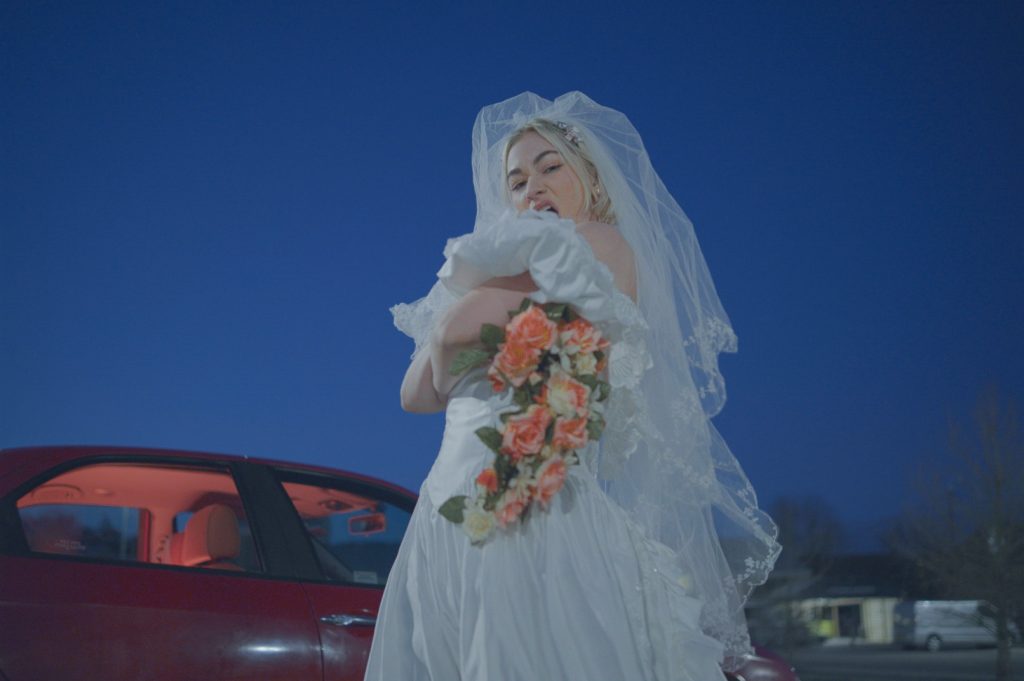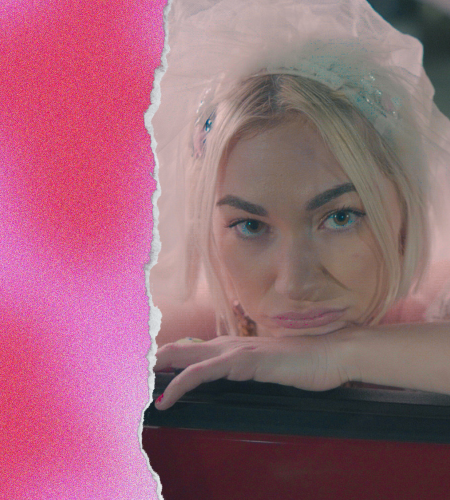
With the release of her electrifying anthem “No Good In Goodbye,” the spotlight continues to shine brightly on Lo Lauren, one of pop music’s most promising talents.
Captivated by the unapologetic spirit of 2010s era pop with a fresh perspective, “No Good In Goodbye” offers a raw and unfiltered glimpse into the complexities of farewell.
Across a growing portfolio of pop gems which balance nostalgia with modern flair, at the heart of Lo’s music lies a deep understanding of the human experience, particularly the tumultuous emotions within love and loss. Drawing from personal encounters and universal themes, she weaves intricate narratives that resonate with listeners; whether it’s the euphoria of newfound love or the anguish of heartbreak, Lo’s musical catalogue captures the ups and downs of life’s emotional rollercoaster.
Beyond her undeniable talent, Lo Lauren stands as a beacon of empowerment for women in the music industry, fearlessly navigating the terrain to challenge stereotypes and carve out her own path. From her infectious charisma to her unapologetic authenticity, Lo Lauren embodies the spirit of resilience and determination – and as she continues to captivate audiences, Lo Lauren solidifies her place as a trailblazer in a landscape ripe for change.
In a candid interview, Lo Lauren talks through “No Good In Goodbye” and reveals the inspiration behind the breakup anthem, as well as her process for navigating creative blocks and how she’s advocating for greater representation and inclusivity.
SheBOPS: Congratulations on the release of “No Good In Goodbye”! What inspired you to create such a powerful break-up anthem?
Lo Lauren: Thank you! For this song we were really inspired by the 2010s and how in your face, bold and feel good the songs were, so it was a big nod to that era. Conceptually I was inspired by a relationship I had where I knew they weren’t my forever person, so I thought ending it wasn’t going to hurt, but actually it turned out to hurt a lot!
What role do you think music plays in processing emotions, particularly during challenging times like breakups?
For me it’s cathartic and the best way of expressing and getting your emotions out, it kind of acts like a funnel and by the end of listening I feel better. But it can also be the worst thing if you’re going through a hard time and that one song comes on that makes you think of someone you don’t want to…
The music video for “No Good In Goodbye” seems to carry a lot of symbolism. Can you elaborate on the concepts behind it?
I wanted the video to be an outpour of melodrama, exploring that angsty, inconsolable period of time post-breakup, where you are doubting every decision you ever made. The wedding dress acted as a symbol for leaving someone that potentially could’ve been your forever. The theme was also a reference to Katy Perry’s “Hot n Cold” music video, whom I am really inspired by.
How did the idea of using your mum’s wedding dress in the music video come about?
I had this image in my head of a runaway bride and luckily my mum still had her wedding dress and it fit, yay! I wanted something dramatic and eye-catching and the big white dress against the red car achieved that, while encompassing the extreme drama of it all.
With your music gaining substantial attention and support, how do you navigate the pressure of expectations for your future releases?
I don’t really think about it – at the end of the day people are gonna like it or not, it’s art and I can’t control what other people think. Obviously I hope they like it, but the minute I start thinking about what other people might want, it’s a minefield and ruins everything good about what you have. We as a team know what songs we have that we want to release, so it’s just a case of sticking to the plan and trusting our instincts!
What do you hope listeners take away from your music, particularly from tracks like “No Good In Goodbye”?
That I’m here for a good time lol. I hope people feel like they can just let go of any stress or any inhibitions when they listen to my music and be free to sing along like a teenager discovering pop for the first time!
Can you share any insights into your songwriting process? Do you typically start with lyrics, melody, or something else?
It’s a real mixture depending on who I’m working with or what I’m feeling that day; if I’m on a camp I’d usually have prepared concept ideas and titles, but equally I like to just go with the flow at the time and see what we create. Generally I lead with melody and then see how I can incorporate any lyrical themes I have.
How do you handle creative blocks or moments of self-doubt during the songwriting process?
Take a break. Some days it just isn’t going to happen and you gotta ride it out. If you can, go for a walk, have some lunch or just anything to get your mind off it. I do believe there’s some higher power in music that filters through so you just gotta show up and be available for it to flow through you when the time comes, and be cool with the fact it won’t be all the time!
What role does storytelling play in your songwriting, and how do you ensure that your narratives resonate with your audience?
Storytelling is so important; if you’re not telling a story in the song then it probably is a bit meh. I will write about anything but usually shape it in a way that can be interpreted as if I’m talking about some sort of relationship – be it love, friendship, with ourselves or whatever. I think we all have relationships in our lives and so that’s immediately an easy thing for an audience to latch onto.
Can you share a bit about your process when performing live and if this has any impact on your approach to creating music?
When I perform live I don’t eat dairy and I concentrate a lot on looking after my voice.
The more I perform, the more I think about how the new songs I write can include more moments for audience interaction and character, because for me the best part about live shows is seeing the artist bring the lyrics to life and present the song in a different way to how it is on the record.
Your upcoming EP ‘Wonderlust’ looks to capture the essence of being a young woman in her 20s. What aspects of this stage of life do you find most inspiring to explore through your music?
Love, loss, coming of age, freedom of expression, nostalgia, figuring out who you are and accepting it, the importance of friendships and realising that every bad thing that happens is actually good because you learn from it.
What challenges have you faced as a woman in music and how have you overcome them?
I think I’ve been lucky in the sense that I have purposely built my team to be full of like-minded, supportive people and so I don’t ever feel like I’m being doubted in my ability or less valued because I’m a woman. I think for me it’s more about being taken seriously as a woman in pop music. I think when you’re making happy, playful pop like I am, there’s a tendency for people to feel like it’s maybe not written from the heart, because it’s disguised with feel-good production – when in fact it is and I care so much about the story, the lyrics and what it means to me. That’s why I just surround myself with good people who get me and share the same passion for writing, re-writing and re-writing again until we’re happy haha.
How do you think the portrayal and representation of women in music has evolved over the years?
I think personally it has improved; I have seen and worked with so many women across many different roles in music. I have a diverse team and creative circle so for me, it’s amazing to be surrounded by equality and women in positions of power. I think at a grassroots level there is much more support and encouragement – musicians actively wanting to work with more women producers, or writing camps hosted specifically for women, which is what we need. Then eventually, those women will become role models at the top level, winning awards and being the ‘go to’ producer or engineer for major artists (which is what we lack most of right now).
What do you believe are the biggest barriers that women in music still face today?
Sometimes it be like… all dicks no tits!! A lot of the wider industry still feels like a boy’s club, often you are walking into rooms with just men and that can feel intimidating. I’ve had a couple of experiences where I felt like my ideas were dismissed in the studio and that made me feel like I wasn’t taken seriously, and I think that disregard of our thoughts, the assumption that we’re perhaps not as skilled or as serious as the guy with the laptop, still happens. There’s still a lack of equal pay and opportunities, not just in music but in society as a whole, so until that changes, we still got work to do!!
Have you observed any changes in the representation of women behind the scenes in roles such as producers, engineers, or executives?
Definitely – in recent years, I’ve worked with a lot more female producers and engineers which is amazing to see, whereas when I first was introduced to the industry working with a female producer was a very rare occurrence. Obviously there’s always room for more, especially at the top level, but I feel like generally there are more women being championed and succeeding in these roles which paves the way for young girls and their futures.
Looking ahead, what changes or improvements would you like to see for women in music, both artistically and professionally?
I’d like to see more women in exec roles, more female songwriters in the big rooms, more female producers working with bigger artists and more women on festival lineups. It still feels like women have a ‘timeframe’ in which they can make it – like there’s this added pressure of age, what stage you are at in your life or how young you look. Which is unnecessary, unhelpful and dumb!! It feels like that doesn’t come into the question at all for men, so I’d like to see people care less about that and just let the girlies live their best lives!
Lastly, what’s one piece of advice you wish you had received when you were just starting out in your music career?
Make more mistakes cos you learn faster!
“No Good in Goodbye” by Lo Lauren is out now.

